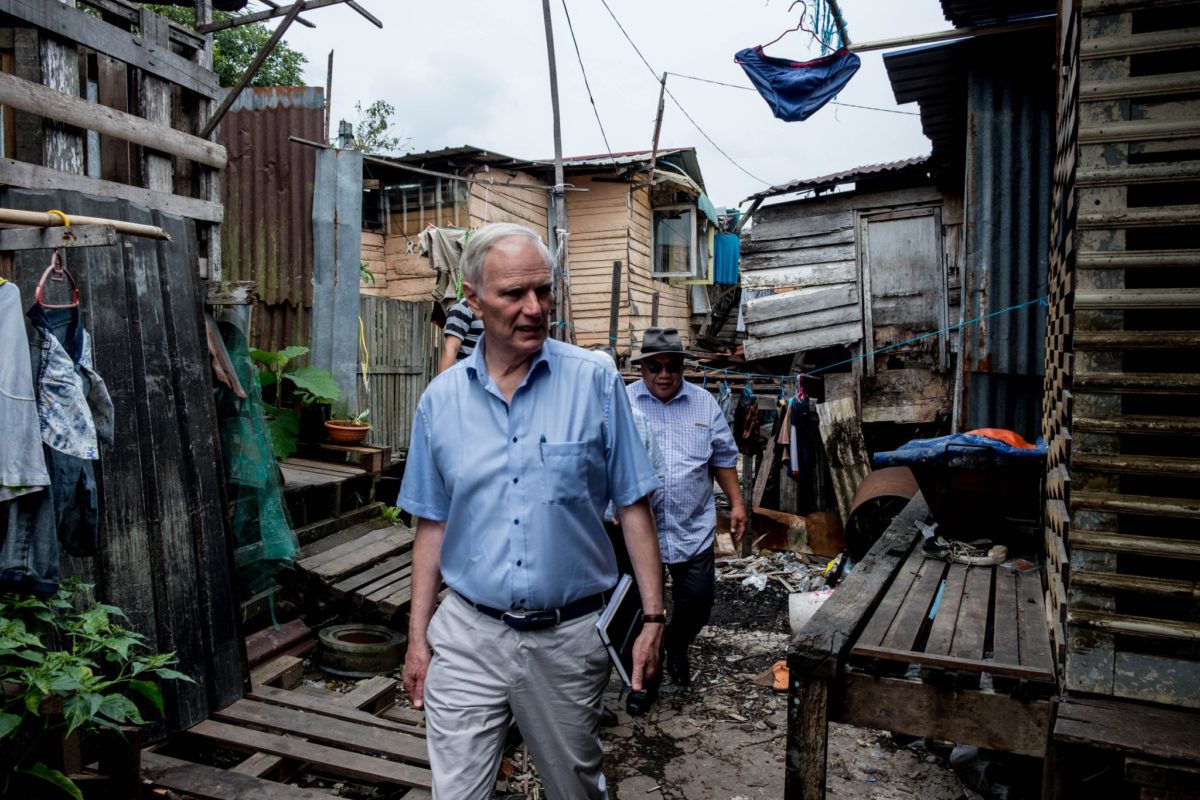KUALA LUMPUR, August 23 — A United Nations (UN) human rights expert has refuted Malaysia’s claim of all but eradicating poverty, saying millions of families are scraping by on very low incomes.
Philip Alston, the UN Special Rapporteur on extreme poverty and human rights, said at the end of his 11-day visit to Malaysia that the monthly RM980 poverty line underpinning Malaysia’s official 0.4 per cent national poverty rate, or less than 25,000 households, was a “very low and highly unrealistic poverty line”.
“Malaysian officials consistently say that poverty has been virtually eliminated, with only ‘pockets’ remaining. That claim, however, is based on a statistical sleight of hand which has had nefarious consequences,” Alston said in a report released today on his visit to several states in Malaysia from last August 13 to 23.
He said Malaysia’s “extremely low” poverty line was inconsistent with the cost of living here.
“A poverty line of RM980 (US$235) would see an urban family of four surviving on RM8, or less than $2 per person per day—a tragically low line for a country on the cusp of attaining high income status. A range of rigorous independent analyses show that the mantra that Malaysia has all but eliminated poverty is just not true.”
He said independent analyses suggested a more realistic poverty rate of 16 to 20 per cent, rather than the official 2016 rate of 0.4 per cent, and about nine per cent of households survive on less than RM2,000 a month.
“As in other comparable countries, a sizable part of Malaysia’s population struggles to get by with tenuous access to food, shelter, education, and health care, and limited ability to exercise civil and political rights. Yet most officials with whom I met took the national poverty rate at face value,” Alston said.
Alston also discounted the mainstream narrative that poverty in Malaysia was largely confined to small numbers in rural areas and in the indigenous population, pointing out that urban poverty was obvious.
“In contrast to the official 2016 poverty rate of 0.0 per cent for the capital Kuala Lumpur, a 2018 Unicef survey of low-income apartments in the city found seven per cent of people living below the national poverty line, 85 per cent in relative poverty, and 99.7 per cent of children living in relative poverty.”
Alston also criticised Malaysia’s new multi-dimensional poverty index that is touted by Ministry of Economic Affairs officials under Pakatan Harapan (PH) as the future of poverty measurement, saying that it yielded “figures that are so low as to beggar belief, and relies heavily on the existing income-based measure.”
“And while revealing that 30.51 percent of people experienced multiple forms of deprivation within a particular period in 2016, the multidimensional poverty index arrived at a figure of 0.86 percent, thus largely replicating the discredited measure but allowing Malaysia to announce and immediately cross a new finish line.”
He urged PH to reassess the national poverty line in the 12th Malaysia Plan 2020-2024, including by measuring relative poverty and including non-citizens in policies.
Alston — who visited Kuala Lumpur, Selangor, Sarawak, Sabah, and Kelantan, and met with state and federal government officials, international agencies, civil society, indigenous communities, academics, and people affected by poverty — said “many” people living above the official poverty line were actually impoverished.
“I spoke with families who have struggled to pay their rent, whose children could not afford to go to school, and who went without health care because of the cost of transportation.
“Undercounting has also led to underinvestment in poverty reduction and an inadequate social safety net that does not meet people’s needs. A fragmented social protection system is putting many people’s rights to food, housing, and education at risk.”
Alston said indigenous people suffered much higher rates of poverty and that their customary lands remained “under siege, jeopardising their livelihoods, food security, and access to traditional medicines.”
“I was troubled to hear state officials speak of the need for indigenous communities to ‘adapt’ and relocate to urban areas in order to secure their rights.”
He also observed that millions of non-citizens — including migrants, refugees, and stateless people — are barred from the public school system, face severe barriers to accessing health care, and are often unable to work legally, and yet are systematically excluded from official poverty statistics.
“The government should urgently revise the way it measures poverty to bring it into line with the country’s cost of living, and it should include vulnerable non-citizen groups in the new measure.
“It should also stop arbitrarily withholding information that is crucial to understanding poverty and inequality, such as household survey microdata.”
He said Malaysia stood out in its “lack of transparency” around public information and noted that in some cases, it did not appear that important data was even being collected.
“Officials with whom I met were consistently unable to provide me with key figures and the Ministry of Housing told me that there are no records kept as to the number of people evicted from public housing,” Alston said.
“There was also a striking unwillingness by the government to undertake estimates of vulnerable populations for whom it does not have exact numbers. For example, officials indicated that they could not provide me with estimates of undocumented immigrants, stateless people, or those in need of low-cost housing.”








